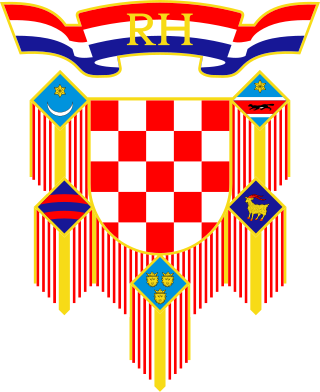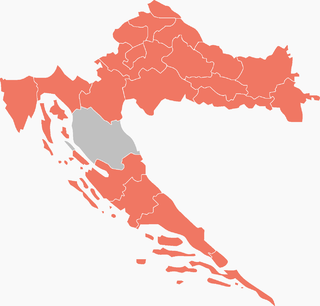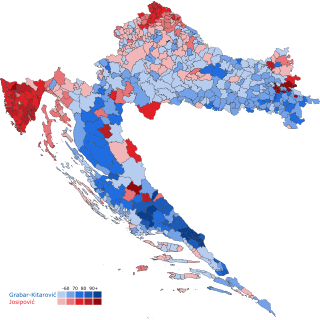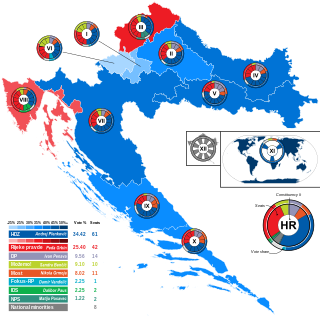 |
|---|
Since its founding in 1990, elections within the Social Democratic Party of Croatia were held numerous times.
 |
|---|
Since its founding in 1990, elections within the Social Democratic Party of Croatia were held numerous times.
The Social Democratic Party of Croatia 2007 leadership election following the death of longtime leader Ivica Račan was held on 2 June 2007. Deputy leader Željka Antunović served as the acting leader and ran for a full term. Little known party spokesperson Zoran Milanović ran as an outsider and reformist promising much needed modernization of the party. Other candidates included Zagreb mayor Milan Bandić and former Foreign Affairs Minister Tonino Picula. Milanović pulled out an unexpected win in the first ballot, but failed to achieve an outright majority. He defeated Antunović in the second ballot and became the leader of the party.
| Candidate | First round | Runoff | ||||
|---|---|---|---|---|---|---|
| Votes | % | Votes | % | |||
| Zoran Milanović | 592 | 38.6 | 828 | 55.1 | ||
| Željka Antunović | 381 | 24.8 | 675 | 44.9 | ||
| Milan Bandić | 313 | 20.4 | ||||
| Tonino Picula | 248 | 16.2 | ||||
| Delegate votes: | 1,534 | 100 | 1,503 | 100 | ||
| Source: First round, Second round | ||||||
The Social Democratic Party of Croatia 2008 leadership election to elect the leader of the party was held on 11 May 2008. The incumbent leader Zoran Milanović had first been elected only a year earlier, but lost a close race in the 2007 general election. Davorko Vidović and Dragan Kovačević hoped to unseat the incumbent. Milanović was easily reelected in the first ballot with almost 80 percent of the delegate vote.
| Candidate | Votes | % | |
|---|---|---|---|
| Zoran Milanović | 1,389 | 78.9 | |
| Davorko Vidović | 208 | 11.8 | |
| Dragan Kovačević | 164 | 9.3 | |
| Delegate votes: | 1,761 | 100 | |
| Source: Official result | |||
The Social Democratic Party of Croatia 2012 leadership election to elect the leader of the party was held on 12 May 2012. The incumbent leader and Prime Minister Zoran Milanović ran for his third term since first being elected in 2007 and was unopposed following the party's landslide victory in the 2011 general election. A total of 38,887 party members were eligible to vote of which an estimated 61% turned out. Zoran Milanović was easily reelected receiving 23,554 votes. 179 votes were invalid. This was the first leadership election in any party in Croatia that was held with all party members being eligible to vote. [1]
The Social Democratic Party of Croatia 2016 leadership election to elect the leader of the party were held on 2 April 2016. All party members were eligible to vote. Zoran Milanović remained the President of the SDP with 62% of the vote. [2]
Zoran Milanović the incumbent leader and former Prime Minister ran for his fourth term since first being elected in 2007 and was opposed by Zlatko Komadina the prefect of Primorje-Gorski Kotar County. [3]
According to the Statute of the SDP, the candidates had to collect 1,000 signatures of support of members of the party for the candidacy to be valid. Komadina collected about 5,200 signatures and Milanović collected about 11,000 signatures. [4] The third candidate Dusko Polovina failed to collect the required 1,000 signatures of support.
| Candidate | ||||
|---|---|---|---|---|
| Votes | % | |||
| Zoran Milanović | 12,429 | 60,16% | ||
| Zlatko Komadina | 8,231 | 39,84% | ||
| Total votes: | 20,689 | Turnout: | 55,05% | |
| Candidate | First round | Runoff | ||||
|---|---|---|---|---|---|---|
| Votes | % | Votes | % | |||
| Davor Bernardić | 8,409 | 45.82 | 11,412 | 64.54 | ||
| Ranko Ostojić | 4,260 | 23.21 | 6,270 | 35.46 | ||
| Orsat Miljenić | 3,160 | 17.22 | ||||
| Tonino Picula | 2,088 | 11.38 | ||||
| Karolina Leaković | 223 | 1.22 | ||||
| Gordana Sobol | 172 | 0.94 | ||||
| Vesna Škulić | 41 | 0.22 | ||||
| Votes: | 18,405 | 100 | 17,778 | 100 | ||
| Source: [5] [6] | ||||||
After bad result on 2020 Parliamentary elections and resignation of party leader Davor Bernardić, Social Democratic Party held new leadership election on 26 September 2020. Five candidates were running for the position of party leader, 17 candidates for members of presidency and 103 candidates for main board. [7] Second round was held on 3 October 2020 between Peđa Grbin and Željko Kolar, with Grbin winning and becoming new leader of the party and leader of opposition. [8]
| Candidate | First round | Runoff | ||||
|---|---|---|---|---|---|---|
| Votes | % | Votes | % | |||
| Peđa Grbin | 3,573 | 41.23 | 5,143 | 64.34 | ||
| Željko Kolar | 2,212 | 25.53 | 2,788 | 34.88 | ||
| Ranko Ostojić | 1,511 | 17.44 | ||||
| Mirela Ahmetović | 1,286 | 14.84 | ||||
| Marino Percan | 50 | 0.58 | ||||
| Invalid/blank votes: | 34 | 0.39 | 62 | 0.78 | ||
| Votes: | 8,666 | 100.00 | 7,993 | 100.00 | ||
| Registered voters: | 11,585 | 74.80 | 11,585 | 68.99 | ||
| Source: [9] [10] | ||||||
The internal party elections are set for 14 September 2024. Election were called follow the poor parliamentary and European elections results and finally the resignation of party leader Peđa Grbin. [11] Ranko Ostojić, party vice president and former Minister of the Interior (2011–2016) withdrew his candidacy after Zoran Paunović's candidacy was confirmed. [12] Siniša Hajdaš Dončić became president after the members elected him by majority vote in the second round held on 22 September 2024. [13]
Confirmed candidates: [14] [15]
| Candidate | First round | Runoff | ||||
|---|---|---|---|---|---|---|
| Votes | % | Votes | % | |||
| Siniša Hajdaš Dončić | 4,189 | 48.78 | 4,447 | 56.46 | ||
| Zoran Paunović | 1,773 | 20.65 | 3,430 | 43.54 | ||
| Mladen Kešer | 903 | 10.51 | ||||
| Mirando Mrsić | 869 | 10.12 | ||||
| Sanja Major | 856 | 9.97 | ||||
| Invalid/blank votes: | 66 | 0.76 | 50 | 0.63 | ||
| Votes: | 8,654 | 39.96 | 7,927 | 36.63 | ||
| Registered voters: | 21,657 | 21,638 | ||||
| Source: [16] [17] | ||||||

The president of Croatia, officially the president of the Republic of Croatia, is the head of state, commander-in-chief of the military and chief representative of the Republic of Croatia both within the country and abroad. The president is the holder of the highest office in Croatia. However, the president is not the head of the executive branch as Croatia has a parliamentary system in which the holder of the post of prime minister is the most powerful person within the country's constitutional framework and everyday politics.

The Social Democratic Party of Croatia is a social democratic political party in Croatia. The SDP is anti-fascist, progressive, and strongly pro-European. The SDP was formed in 1990 as the successor of the League of Communists of Croatia, the Croatian branch of the League of Communists of Yugoslavia, which had governed Croatia within the Socialist Federal Republic of Yugoslavia since World War II.

Zoran Milanović is a Croatian politician serving as the president of Croatia since 2020. Prior to assuming the presidency, he was prime minister of Croatia from 2011 to 2016, as well as president of the Social Democratic Party (SDP) from 2007 to 2016.

Ljubo Jurčić is a Croatian economist, current president of the Croatian Association of Economists since 2006 and former Minister of Economy from 2002 to 2003.

Presidential elections were held in Croatia on 27 December 2009 and 10 January 2010. Twelve candidates participated in the first round, prior to a run-off between first-round winner Ivo Josipović and runner-up Milan Bandić. In the run-off, Josipović won a landslide victory, receiving 60.3% of the vote becoming the first elected president nominated by the Social Democratic Party of Croatia (SDP). The incumbent president Stjepan Mesić, who was first elected in 2000 as the candidate of the Croatian People's Party and re-elected in 2005 as an independent, was ineligible to seek re-election to a third term due to term limits.

Ivo Josipović is a Croatian academic, jurist, composer, and politician who served as President of Croatia from 2010 to 2015.

In Croatia, the Opposition comprises all political parties represented in the Croatian Parliament that are not part of the Government which is supported by the parliamentary majority.

Rivers of Justice is a centre-left political alliance in Croatia. Gathered around the Social Democratic Party of Croatia (SDP), the coalition was originally formed in 2010 as the Kukuriku coalition. This somewhat facetious name meaning 'cock-a-doodle-doo', taken from a restaurant of the same name in Kastav where the coalition leaders first convened in July 2009, became well known and was eventually taken as the coalition's official name. The coalition originally consisted of four centrist and centre-left parties in the Croatian Parliament: the Social Democratic Party of Croatia (SDP), Croatian People's Party – Liberal Democrats (HNS-LD), Croatian Party of Pensioners (HSU) and Istrian Democratic Assembly (IDS). The coalition won an absolute majority of seats in the 2011 parliamentary election and successfully formed a government led by Zoran Milanović (SDP).

Parliamentary elections were held in Croatia on 8 November 2015. All 151 seats in the Parliament were up for election. This parliamentary election was the 8th since the first multi-party election in 1990 and the first since Croatia joined the European Union in 2013. The ruling center-left Croatia is Growing coalition, led by Prime Minister Zoran Milanović, was challenged by the center-right Patriotic Coalition led by the HDZ and headed by its party chairman Tomislav Karamarko, and also faced several new political coalitions.
Opinion polling for the 2015 Croatian parliamentary election started immediately after the 2011 general election. Monthly party ratings are conducted by Ipsos Puls, Mediana and Promocija Plus.

Siniša Hajdaš Dončić is a Croatian politician serving as president of the Social Democratic Party and as Leader of the Opposition since September 2024. He previously served as Minister of Maritime Affairs, Transport and Infrastructure from 2012 to 2016. He also served as Prefect of the Krapina-Zagorje County from 2009 to 2012.

Presidential elections were held in Croatia on 28 December 2014 and 11 January 2015, the sixth such elections since independence in 1991. Only four candidates contested the elections, the lowest number since 1997. Incumbent president Ivo Josipović, who had been elected as the candidate of the Social Democratic Party in 2009–2010, was eligible to seek reelection for a second and final five-year term and ran as an independent. As no candidate received 50% of the vote in the first round in December 2014, a run-off took place in January 2015 between the two candidates with the most votes, Josipović and Kolinda Grabar-Kitarović. Grabar-Kitarović went on to win the elections by a slim margin of 32,509 votes or 1.48%, making her Croatia's first female president.

Gordan Maras is a Croatian economist and politician who served as a minister at Ministry of Entrepreneurship and Crafts at the Cabinet of Zoran Milanović from 2011 until 2016. He was a member of the centre-left Social Democratic Party (SDP).

Presidential elections were held in Croatia on 22 December 2019. Social Democratic Party nominee Zoran Milanović narrowly defeated incumbent president Kolinda Grabar-Kitarović in a second round of voting.
The Bridge, previously known as Bridge of Independent Lists until November 2020, is a political party in Croatia founded in 2012. The party is led by Božo Petrov, its founder and the former mayor of Metković, deputy prime minister and speaker of the Croatian Parliament. Although the party leaders initially avoided ideological topics, The Bridge underwent a rebranding prior to the 2020 Croatian parliamentary election, establishing itself as a social conservative and soft Eurosceptic party.

Peđa Grbin is a Croatian lawyer and politician who served as president of the Social Democratic Party (SDP) from 2020 to 2024. He was also Leader of the Opposition from 2020 to 2022 and from May to September 2024. He has represented the VIII electoral district in the Croatian Parliament since 2011.

Silvano Hrelja is a Croatian politician who has been Leader of the Croatian Party of Pensioners (HSU) since 2008 and a member of the Croatian Parliament for the VIII electoral district since 2003 having been elected in the 2003, 2007, 2011 and 2015 parliamentary elections.

Parliamentary elections were held in Croatia on 17 April 2024 to elect the members of the 11th Sabor. Prior to the elections, the government consisted of a coalition of the Croatian Democratic Union and Independent Democratic Serb Party, with parliamentary support of five national minority MPs, two MPs from the Croatian Social Liberal Party and Croatian Demochristian Party, and one independent MP, Silvano Hrelja.

Tomislav Tomašević is a Croatian politician, activist, environmentalist and political scientist who is serving as mayor of Zagreb since 2021. He is one of the leaders of the local Zagreb is OURS! political party and the national We Can! political party. Since the 2017 Zagreb local elections, he has been a delegate in the Zagreb Assembly. He was also elected to the Croatian Parliament in the 2020 election. He serves as the de facto leader of the Green–Left Coalition.
A presidential election is scheduled to be held in Croatia on 29 December 2024, with a second round on 12 January 2025 if no candidate receives a majority. Incumbent president Zoran Milanović is eligible for a second term. His first term began on 19 February 2020 and will end on 18 February 2025.